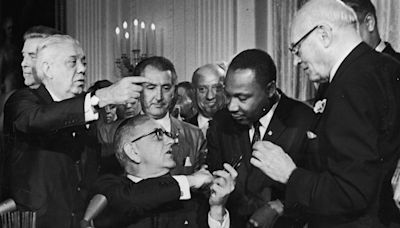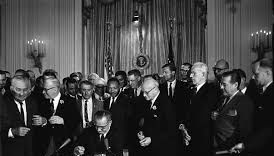Search results
The Civil Rights Act of 1964 (Pub. L. Tooltip Public Law (United States) 88–352, 78 Stat. 241, enacted July 2, 1964) is a landmark civil rights and labor law in the United States that outlaws discrimination based on race, color, religion, sex, and national origin.
Jan 4, 2010 · Learn about the landmark legislation that ended segregation and banned discrimination on the basis of race, color, religion, sex or national origin. Find out how President Kennedy proposed it, how President Johnson signed it and how it sparked the civil rights movement.
6 days ago · Civil Rights Act, (1964), comprehensive U.S. legislation intended to end discrimination based on race, color, religion, or national origin. It is often called the most important U.S. law on civil rights since Reconstruction (1865–77) and is a hallmark of the American civil rights movement.
- The Editors of Encyclopaedia Britannica
- The Civil Rights Act of 1964 was intended to end discrimination based on race, color, religion, or national origin in the United States. The act ga...
- The Civil Rights Act of 1964 was signed into law on July 2, 1964, by U.S. President Lyndon B. Johnson.
- The Civil Rights Act of 1964 had been proposed by U.S. President John F. Kennedy in 1963.
Feb 8, 2022 · Learn about the landmark legislation that prohibited discrimination in public places, schools, and employment. Read the full text of the act, signed by President Lyndon Johnson, and explore its historical context and impact.
The Civil Rights Act of 1964 outlawed racial segregation in public accommodations including hotels, restaurants, theaters, and stores, and made employment discrimination illegal.
On 2 July 1964, Johnson signed the new Civil Rights Act of 1964 into law with King and other civil rights leaders present.
The law’s eleven sections prohibited discrimination in the workplace, public accommodations, public facilities, and agencies receiving federal funds, and strengthened prohibitions on school segregation and discrimination in voter registration.




